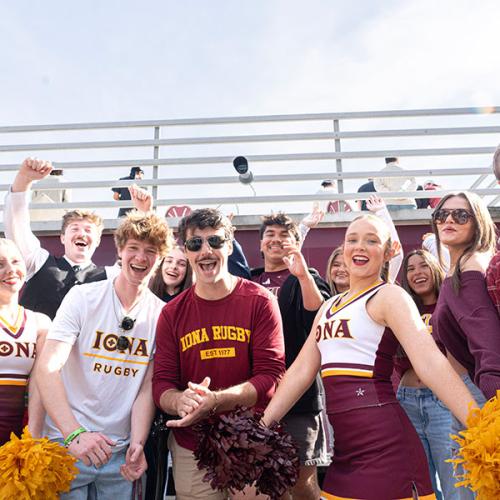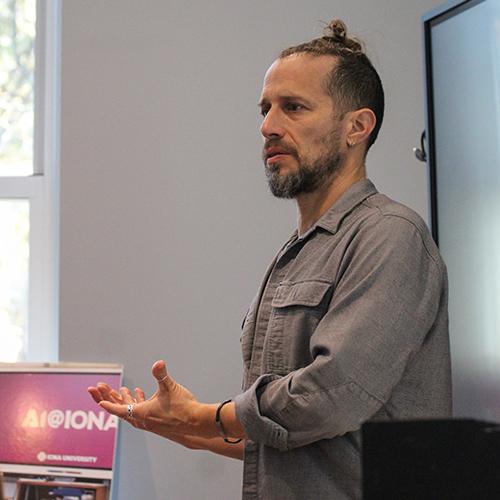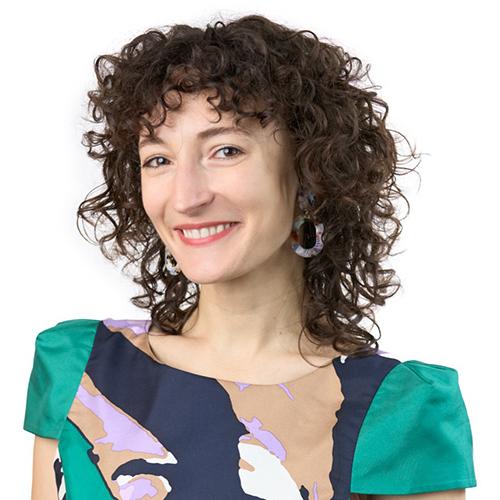Kimberleigh Costanzo ’14 Turns Dreams into Reality for Artists and Performing Arts Organizations
Name: Kimberleigh Costanzo ’14
Hometown: Bethpage, N.Y.
High school: Plainedge High School
Major: Philosophy
Minor: Dance
Job Title: Director of Grants Administration & Program Officer
What do you love most about what you're currently doing?
Currently, I work as the director of grants administration and a program officer for the Howard Gilman Foundation, the largest private funder of nonprofit performing arts organizations in New York City. I enjoy how dynamic my day to day work is, and the impact I'm able to have in a space I care so deeply about: arts and culture. Our grantmaking helps to support artists, both in living sustainable lives and in creating the artistic work that will shape cultures for years to come. It is both a privilege and an honor to do this work and I don't take the responsibility lightly.
What is a day in the life like at your company/in your role?
Each day is different. I manage the grants administration team, which means I spend some days in team meetings, supervising projects, and providing guidance. My work there is focused on ensuring that the grants management system is functional and the systems are in place to efficiently move applicants through the application process and move funds to the organizations we support.
As a program officer, I work directly with our applicants and grantees, meeting with the leaders of dance, music, and theatre organizations to discuss their programming, their finances, their infrastructure, and the challenges they're facing. Based on those rich conversations, I make recommendations for funding designed to help meet the needs I'm hearing about from our applicants and support the Foundation's vision of a more equitable and thriving performing arts ecosystem.
Why did you decide to study your particular major?
I chose to major in philosophy after a particularly interesting philosophy course during my first semester at Iona. I knew that I wanted a humanities major and, after that first course, I saw that studying philosophy would be a way of engaging with texts and concepts from history, religious studies, English, and many other programs all at once. Because it was a small program, I also saw the opportunity to form close relationships with my professors, to engage in independent studies, and to more actively craft a curriculum around my needs and interests. My dance minor was organic-- I had been dancing my whole life and saw an opportunity to expand my dance vocabulary through classes within Iona's performing arts program and to explore my choreographic voice through independent study.
How did Iona prepare you to get where you are today?
The time that I spent at Iona set me on a path that I am still following today. It instilled a resilience in me and a talent for building a community. At Iona, I was making connections between concepts I was exploring in my Honors thesis and artistic work that I was creating and performing on stage. I was making frequent trips into New York City to take dance classes and engage with the experimental dance and performance community there. The work that I do today would not be possible without the skills and interests I was cultivating, but it also wouldn't be possible without the proactive attitude that I developed by charting my own path inside of Iona.
Were you involved in student groups or activities? If so, how did they shape or support your career path?
I was a part of the Honors Program at Iona. I was also a member and eventual captain of Iona's award-winning mock trial team and participated in programs through Campus Ministries. As a dance minor, I took part in the annual dance ensemble performances and choreographed my own work for presentation each spring. My sophomore year, I studied abroad in Dublin, Ireland with a cohort of other Iona students. Each of these activities was important not solely because of the activity itself, but because of the people it connected me to. I learned so much navigating these student groups and working to find my place in the broader Iona community.
Was there a professor, staff member, or peer who made an impact on you while you were at Iona? If so, who and why?
One of the most intellectually exciting experiences during my time at Iona was the work I did on my Honors thesis, under the supervision of Dr. James Stillwaggon. Dr. Stillwaggon followed my lead and allowed me to explore the concepts I was interested in, but helped to ground those curiosities by introducing me to texts that weren't otherwise being studied in any of my typical philosophy coursework, and that were vital for moving my ideas forward. The introduction to important gender theorists like Judith Butler shaped not only the thesis that I eventually wrote and presented, but also my politics going forward. The respect that he had for my ideas was incredibly encouraging.
What is the lasting impact Iona has made in your personal and professional life?
My time at Iona shaped the person that I am today. It grounded me in the importance of community and helped me to articulate so many of the values that guide me personally, professionally, and politically today. Being at Iona was the start of a journey to finding my voice, academically and artistically, and I feel the impact of my experiences there every day.
What advice do you have for a current Iona student who wants to follow a similar path?
First and foremost, find your people. Surrounding yourself with people who are intellectually curious, have similar passions and interests, and an eagerness to learn will make all the difference in your college experience. You may find those people in classes or through campus activities, or you may find them through volunteer work, activism, organizing, or artistic pursuits off campus. Remember that your college experience is more than just the courses that you take-- it is the people you meet, the interests you cultivate, the skills you build, and the values you hold while you navigate those four years. So, don't let yourself feel limited by the options in front of you.
If you're specifically interested in a career in the arts or in philanthropy, know that there are opportunities for engaging in that work on campus, whether that's producing a performance, working in fundraising for a club or campus group, or gathering with other students to explore forms of mutual aid. Though there are some concrete skills that will benefit you in a career in arts philanthropy, all people are engaged with culture and all people are engaged with some form of philanthropy; expanding your definition of those concepts can set you up for a career down the line.



